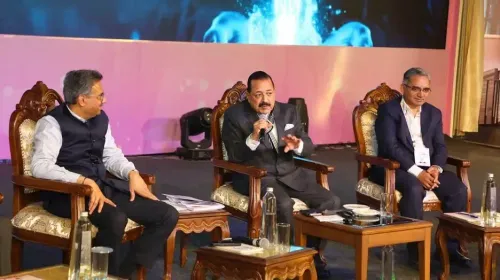Boeing's Indian Supply Chain Exports Aerospace Parts Worth Rs 10,000 Crore Annually

Synopsis
Key Takeaways
- Boeing exports aerospace components worth Rs 10,000 crore annually from India.
- It employs 5,000 engineers at its Bengaluru facility.
- Boeing aligns with ‘Make in India’ and ‘Atmanirbhar Bharat’ initiatives.
- Localization is critical, requiring 50% indigenous content.
- Boeing has 600 aircraft orders from Indian airlines.
Bengaluru, Feb 13 (NationPress) Boeing’s supply chain in India is exporting a remarkable Rs 10,000 crore worth of aerospace components annually, establishing the US aircraft manufacturer as the largest foreign producer in the nation, according to Boeing India President Salil Gupte.
He refuted claims that high-tech aviation manufacturing is absent in India. "That may have been true 10 years ago, but today, India has an interesting opportunity," he remarked during an interview with NDTV Profit.
Gupte emphasized that Boeing has broadened its operations in India, employing around 5,000 aeronautical engineers at its 43-acre site in Bengaluru, focusing primarily on domestic projects but also assisting with some international initiatives.
Boeing boasts an extensive supply chain across India, with suppliers located in Bengaluru, Hyderabad, Gujarat, and northern India. "These suppliers export about Rs 10,000 crore worth of aerospace components every year, making us the largest foreign OEM (original equipment manufacturer) in India," Gupte stated at the 'Aero India 2025' event.
He further emphasized that Boeing is aligning with the ‘Make in India’ and ‘Atmanirbhar Bharat’ initiatives within the defense sector.
“A crucial aspect of defense manufacturing is localization. Any final assembly for a defense contract today necessitates 50 percent indigenous content. Therefore, we have been investing in localization initiatives,” Gupte explained.
He also highlighted the significance of partner companies, such as the US tech giant GE, which is establishing an engine manufacturing facility in collaboration with Hindustan Aeronautics Ltd (HAL).
"GE plays a significant role in many of our platforms for both civil and defense," Gupte noted.
"For final assembly in India, tier-1 suppliers and engine manufacturers must already be present, and that is currently happening," he stated.
With eight decades of presence in India, Gupte noted that Boeing's influence has significantly increased over the last 10 years.
Boeing has actively supported civil aviation clients and has introduced several key platforms in the defense sector, including the C-17 cargo aircraft, P-8 maritime patrol aircraft, and Apache helicopters.
"The head of the state fleet, which transports the Prime Minister and President of India, is also a Boeing fleet," he highlighted.
Boeing is engaged in ongoing discussions with India’s defense forces regarding their requirements. Six more Apache anti-tank helicopters are slated for delivery to the Army, while 22 Apaches have already been supplied to the Air Force.
Gupte also mentioned discussions surrounding additional reconnaissance aircraft, stating, “There is a demand for more P-8s, but it is up to the Navy to determine when and how procurement will proceed.”
He underscored that Boeing’s defense sales enhance interoperability between India and the US in the Indo-Pacific region. "The more US equipment the Indian defense services acquire, the greater the interoperability with US assets in the region, ensuring a robust, free Indo-Pacific force," he noted.
Boeing currently has nearly 600 aircraft orders from Indian airlines, including Air India, Akasa, and SpiceJet, encompassing both narrow-body and wide-body aircraft.
Gupte highlighted that Boeing’s operations in India are mutually beneficial for both the US and India. “Every single employee we have in India and every supplier contributes to what we do in India and the US. When India orders airplanes, those orders create thousands of jobs in the US as well,” he added.










